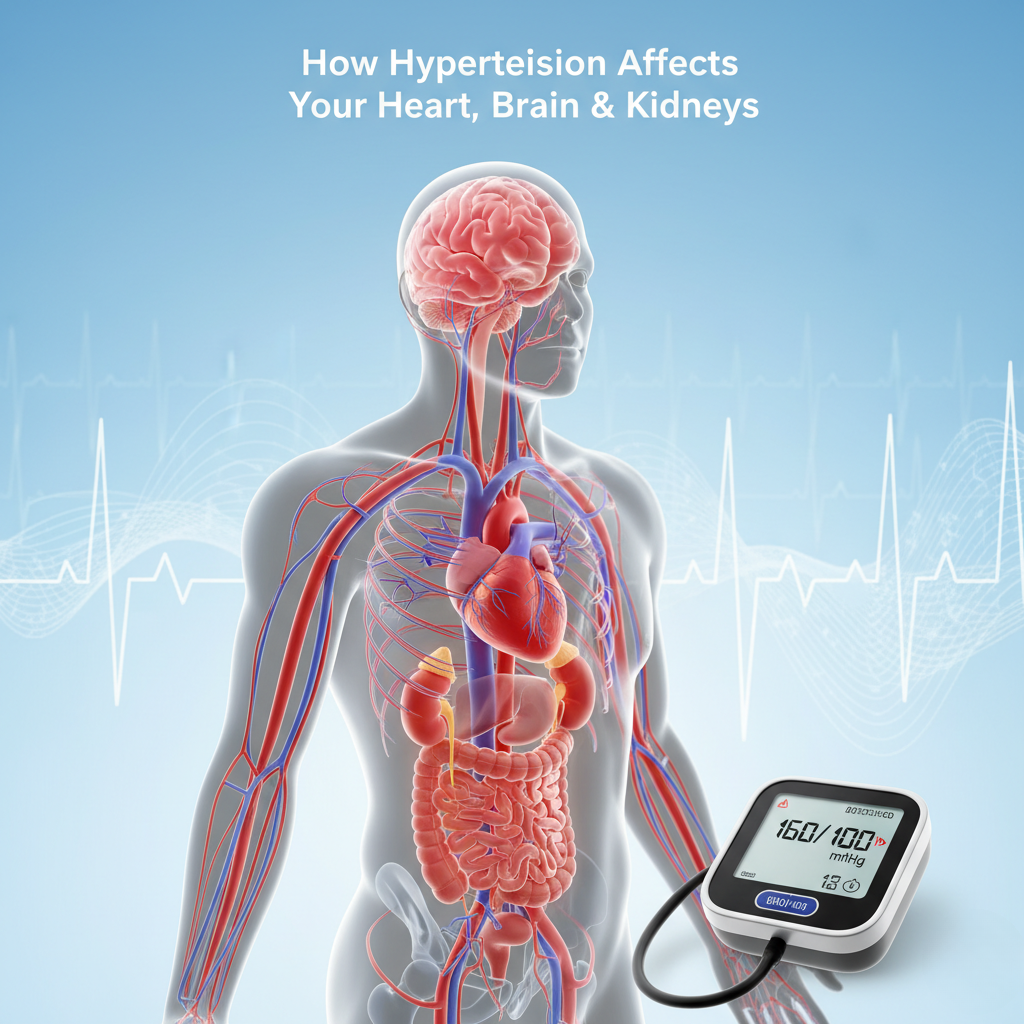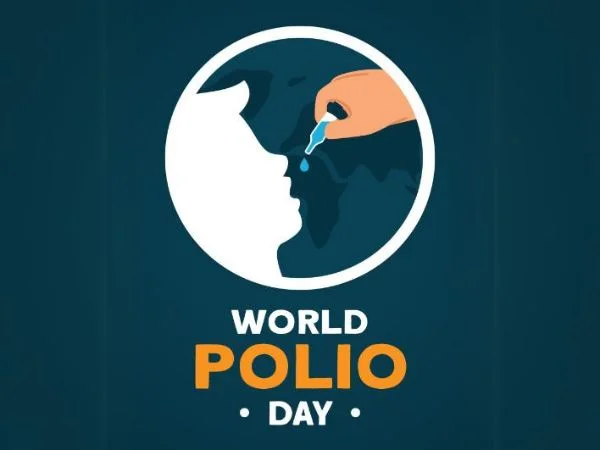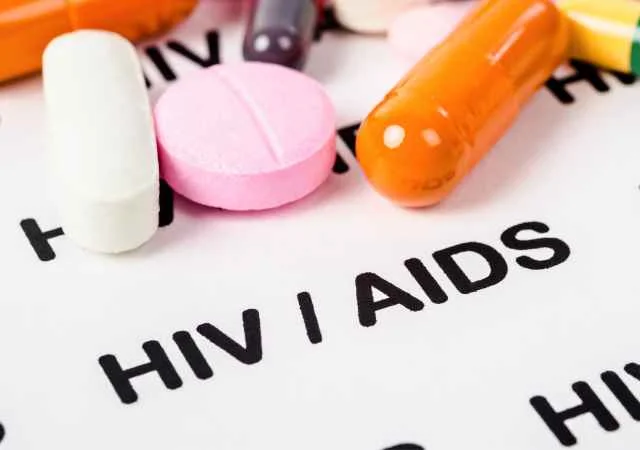When it comes to health problems in daily life, the most common issue these days is Hypertension. As we approach 2026, we are witnessing such accidents on a massive scale. In a simple definition, high blood pressure is hypertension; it is the degree to which your artery walls are narrowed by blood. And it is greater than the ideal amount for a longer duration. It is also referred to as a silent killer since it rises with time and never exhibits any signs. But it attacks our vital organs if not controlled in a timely course of time. Due to this, blood vessels within your brain also get damaged, and this can raise the risk of stroke.
The renal arteries become damaged due to increased pressure of blood, eventually causing them to lose their function of carrying out their job, such as filtering, which to cause kidney disease. The second hazard that can happen is the effect on the eyes that causes blindness.

Atherosclerosis, however, is a process that becomes accelerated if hypertension is not optimally controlled. Atherosclerosis is the deposition of fats within the arteries that hardens the arteries and reduces them. They then produce chest pain and other complications by restricting the blood supply. According to a report by PMC, in India alone, nearly 22.6% of adults above the age of 15 are affected by Hypertension, out of 24.1% men and 21.2% women. In short. Hypertension may be the reason behind countless issues for all of the major organs, i.e., the Heart, Brain, kidneys, and eyes. And at night, you must monitor your body every day, eat healthy food, and control stress.
In this video, you will understand how high blood pressure damages all these precious organs, an easy, everyday routine for healing and avoiding hypertension, and new 2025 health gadgets and equipment that can track your blood pressure and put you ahead of your health.
What Happens Inside Your Body When Your Blood Pressure Is High?
Blood pressure is the pressure your blood puts on your artery walls. It’s in two numbers — systolic (the first number, or pressure when your heart is beating) and diastolic (the second number, or pressure when your heart is resting). When these numbers stretch out over time, it creates hypertension, and the impact of hypertension on your body begins subtly.
High pressure in your arteries gradually wears out the interior of them. The constant pressure also stiffens and narrows the arteries, making them less pliable. That makes your heart work harder to pump blood through, one of the primary consequences of hypertension that can result in heart strain and heart disease.
When arteries are hardened, blood supply to organs such as the heart, brain, and kidneys is diminished. With less oxygen molecules being transported to these organs, the body begins to feel stressed out, exhausted, and overworked — another signal of the long-term effect of hypertension.
You can think of it like water hoses in your house: when pressure builds up too high, hoses leak or burst. The same occurs with your arteries — minimal damage that adds up over time.
Impact on the Heart
The heart is among the organs that will be affected first by hypertension. The heart must work very hard with ongoing high blood pressure in an attempt to circulate blood via constricted arteries. The work thickens the heart muscles, and particularly the left ventricle, because of left ventricular hypertrophy. The thickening, over time, compromises the heart’s capacity to relax and fill with blood properly.
As the disease progresses, the effect of the hypertension may manifest in such serious issues as heart failure, coronary heart disease, abnormal heart rhythm (arrhythmia), and even myocardial infarction or heart attack. These are fatal if they are left there.
Early signs are usually fatigue, breathlessness, pain in the chest, and swelling of the ankles. These tend to develop slowly, and therefore, people ignore them until the damage is firmly established.
The strongest lifestyle causes of these hypertension effects are stress, excessive salt, cigarette smoking, and excessive drinking — all serving to overload the heart.
Prevention has also gone smart in 2025. AI-powered heart rate monitoring apps, home ECG devices, and intelligent blood pressure monitors now allow people to track their heart health in real-time. These sophisticated devices detect hypertension effects early and protect your heart before it becomes serious.
Impact on the Brain
The brain is very susceptible to fluctuations in blood supply, and this is why the effect of hypertension on it may be dangerous. When blood pressure is constantly high, it places pressure on the arteries in the brain. Eventually, it might cause these arteries to become clogged, reduced in size, or weakened, and this increases the chance of a stroke. One of the most dangerous effects of hypertension.
Even the smaller arteries of the brain can be damaged from this constant pressure. This lessens oxygen and nutrient supply to brain cells, leading to forgetfulness, slow thinking, and dementia in the long run. Most also suffer from poor concentration, confusion, and mental fog, which are some of the initial warning signs that the brain is not receiving adequate blood supply.
Recent 2024–2025 research also identified significant associations between early Alzheimer’s disease and chronic hypertension and fully explained just how crucial it is to control blood pressure in maintaining a keen mind.
Impact on the Kidneys
The kidneys are the filtering system of the body, cleansing waste and excess fluid from the blood within tiny tubes called nephrons. But with elevated blood pressure, those tiny tubes are constantly under tension. One of the most dangerous of the body effects of hypertension.
Over time, the extra pressure hardens and narrows the kidney arteries, and it becomes increasingly hard for the kidneys to filter blood. With less effective filtering, wastes build up, leading to advanced hypertension effects such as CKD. In some cases, a person is diagnosed with protein in urine, and if kidney function keeps declining, one becomes dialysis-dependent.
The warning signs in the early stages are usually puffy eyes in the morning, swollen ankles or feet, tiredness, and low urine output. These are not necessarily evident symptoms but are indications that the kidneys are working under strain.
By 2025, technology will enable early kidney care. Intelligent kidney function monitor devices, AI-powered urine test strips, and tele-nephrology consultations already make hypertension’s impact on the kidneys detectable much earlier. Back-end blood pressure monitoring and lifestyle tracking are still the optimal methods to shield your kidneys and prevent long-term damage.
The Hidden Loop – How These Organs Influence Each Other
The effect of blood pressure on your body is not isolated — the brain, heart, and kidneys are all interconnected. If one gets hit, then the other two will get hit sooner or later. For example, abnormally elevated blood pressure can wear out the heart so much that it won’t be able to function correctly. This decreases blood supply to the brain and kidneys, resulting in poor cleansing and low oxygenation. The action of high blood pressure on the kidneys worsens the situation. Damaged kidneys cannot filter waste and fluid properly, and hence, the blood pressure rises further, putting pressure on the heart.
At the same time, compromised blood supply to the brain also influences how it responds to stress and hormones. The brain can release excess stress hormones such as cortisol, which once more increases blood pressure, thus perpetuating a cycle of effects of hypertension.
This vicious cycle shows how dependent our organs are on each other. Taking care of one organ indirectly benefits the others. Maintaining healthy blood pressure with a healthy diet, exercise, avoiding stress, and monitoring it from time to time halts this cycle. And at the same time, it protects the heart, brain, and kidneys.
What can you do Starting Today?
The good news is that the effects of hypertension on your body can be managed and even reversed through simple daily routines. Small steps taken every day make a colossal difference.
Daily Routines to Follow
- Eat less salt and processed foods: Try to reduce chips, packaged food, and pickles. Try herbs and lemon to add flavor instead of extra salt.
- Have plenty of water: Stay hydrated to maintain normal blood circulation.
- Exercise 30 minutes per day: Dance, jog, bike, or walk quickly — something that raises your heart rate.
- Be a healthy weight: Each kilo over that puts additional strain on your heart and vessels.
- Sleep 7–8 hours: Insomnia doubles hypertension symptoms by elevating stress hormones.
Follow a DASH or Mediterranean diet that consists of high fruit, vegetable, whole grain, nuts, olive oil, and low-fat protein consumption.
Meals to follow on a sample day:
- Breakfast: Oatmeal with nuts and fruits
- Lunch: Dal and vegetables with brown rice or chapati
- Dinner: Pan-fried fish or paneer with olive oil dressing and salad
For the management of stress, practice yoga, deep breathing, or relaxation software. Which will relax your mind and maintain your blood pressure. In 2025, you will also use smartwatch BP alert, web-based nutrition recommendations, and health monitoring dashboards to monitor your progress. And avoid the long-term effects of hypertension.
When to See a Doctor
Though the consequences of hypertension are generally not silent, some indicators require immediate medical consultation. Do not neglect the following life-threatening signs: severe headache, blurred vision, chest pain, confusion, or swelling of the face, hand, or foot. They could be a sign that your blood pressure is very high or that your organs are under attack.
It is always more desirable to have your blood pressure and organ function checked regularly after the age of 30. Or earlier if you have an obesity-related risk factor, genetic factor, tension, or minimal physical exercise. Early screening can identify hypertensive effects if screening begins early.
If your doctor has prescribed medication, take it. Blood pressure medications work only when taken consistently — to stop or skip is likely to undo months of control and raise pressure again, hardening your heart and kidneys.
Following consistent follow-ups, honesty with your doctor, and keeping up with treatment. That is the formula for living with the impact of hypertension and preventing complications down the road.
Final Thoughts
Blood pressure regulation is not an overnight affair — it’s something you perform daily for the remainder of your life. The damage that elevated blood pressure inflicts upon your system is a gradual one. So regularity with good practices and periodic screening really is what carries you through long-term. Harness the power of present-day technology to your advantage. Digital dashboards, smart watches, and health apps that enable you to track your BP trends, heart rate, and kidney function in real-time. Through these real-time monitoring, you are in control of detecting changes early and acting fast. Don’t forget, small day-to-day adjustments diet management, exercise more, stress management, and timely medication. It c
an spare your vital organs years of damage. Being alive in 2025 is about using data, discipline, and daily focus.


